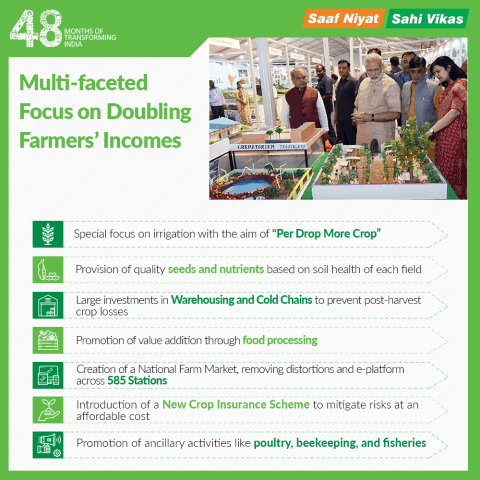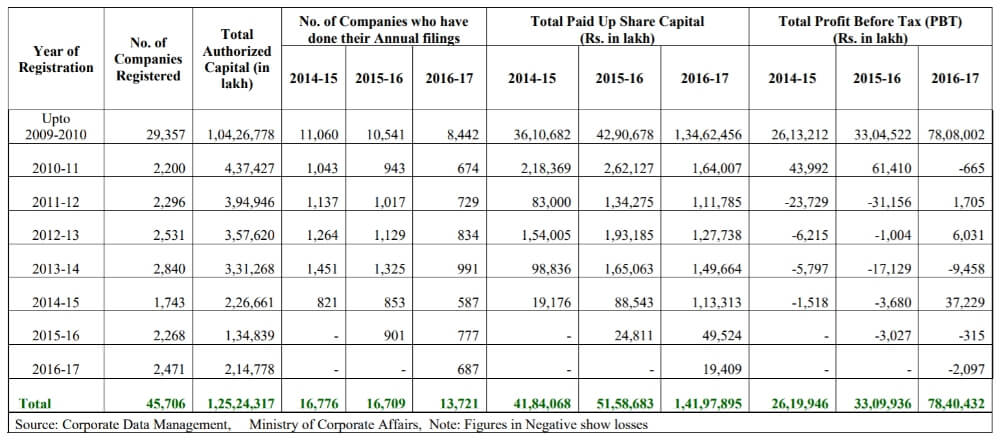[orc]Here is a 2-part series on the claims made by the current government on the initiatives related to Agriculture.
The BJP government has published an infographic on the 48-months portal. The info-graph is a part of a larger sub section on the government’s commitment to farmers. It makes seven claims about the government’s focus on doubling farmer’s incomes. This article is a fact check of the claims made in the infographic. (Read Part-1 here)

Is there promotion of food processing?
The fourth claim is that there is ‘Promotion of value addition through food processing’.
A response in Lok Sabha from February 2019 states that ‘an innovative umbrella scheme, ‘Pradhan Mantri Kisan SAMPADA Yojana (PMKSY)’ has been launched in 2017 to promote modernisation and capacity enhancement of food processing industries in the country in all aspects including infrastructure and environment friendly packaging. The implementation period of the scheme is 2016-2020 with a total allocation of Rs.6000 crores. The PMKSY has seven component schemes viz; (i) Mega Food Parks, (ii) Integrated Cold Chain and Value Addition Infrastructure, (iii) Infrastructure for Agro-Processing Clusters, (iv) Creation of Backward and Forward Linkages, (v) Creation/Expansion of Food Processing & Preservation Capacities, (vi) Food Safety and Quality Assurance Infrastructure and (vii) Human Resources and Institutions. The PMKSY is implemented in all the States of India and is not any region specific. The schemes under PMKSY are demand driven. The objectives of PMKSY are to create modern infrastructure with efficient supply chain management from farm gate to retail outlet, to give a major boost to the growth of food processing sector in the country and help government’s initiative in doubling of farmers’ income, create huge employment opportunities especially in the rural areas, reduce wastage of agricultural produces, increase the processing level and enhance the export of the processed foods’.
Under the scheme, grants-in-aid @ 35% of the eligible project cost is provided in General Areas and 50% of the eligible project cost in North Eastern States including Sikkim and Difficult areas including Himalayan States (Himachal Pradesh, J&K & Uttarakhand), notified ITDP areas and Islands subject to a maximum of Rs.5.00 crore. The food processing units can be setup in Mega Food Parks (MFPs), Agro Processing Clusters (APC) and Designated Food Parks (DFPs) notified by the Ministry from time to time. However, in States / UTs having no MFP, APC or DFP, the food processing units may be setup anywhere in the State / UT. Further, the units having majority stake of SC / ST promoter(s) and with an eligible project cost of more than Rs. 5 (five) crore can be set up at any location in the country. To meet the credit demand of the food processing sector, the food and agro-based processing units and cold chain infrastructure have been brought under the ambit of Priority Sector Lending (PSL) by the Reserve Bank of India (RBI) with effect from 23.04.2015. A special food processing fund of Rs.2000 crore has been created with the National Bank for Agriculture and Rural Development (NABARD) in 2014-15 for providing affordable credit to designated Food Parks and Agro Processing Units located in the designated Food Parks. Further, under various schemes of the PMKSY, subsidy is provided to the investors in food processing sector to enhance their credit worthiness for bank loans to set up various food processing industries. However, it has to be noted here that the Ministry of Food Processing Industries has been implementing Mega Food Park Scheme since 11th Five Year Plan to create modern infrastructure for the food processing.
Lastly, it has been stated that ‘with a view to promoting food processing industries in the country, Ministry of Food Processing Industries (MoFPI) has sanctioned 42 Mega Food Parks, 234 Integrated Cold Chain and Value Addition Infrastructure, 17 Agro Processing Clusters, 32 Backward and Forward Linkages and 83 food processing units under various schemes of the Pradhan Mantri Kisan Sampada Yojana (PMKSY)’. The following table shows the number of food processing industries registered in the country over the years as per data shared in the parliament.

Claim: Promotion of value addition through food processing.
Fact: The government has taken steps to promote the food processing industry in the country. However, some of these steps have been initiated long before the BJP government. The impact of the policies has not officially been evaluated. However, the claim is TRUE.
Was a national farmers market created?
The fifth claim is that there is a ‘creation of a national farm market, removing distortions and e-platform across 585 stations’.
As per a response provided by the government in the Lok Sabha in March 2018, ‘National Agriculture Market (eNAM) is a pan-India electronic trading portal which networks the existing APMC Mandis to create a unified national market for agricultural commodities’. The official eNAM website states that ‘the NAM Portal provides a single window service for all APMC related information and services. This includes commodity arrivals & prices, buy & sell trade offers, provision to respond to trade offers, among other services. While material flow (agriculture produce) continues to happen through mandis, an online market reduces transaction costs and information asymmetry’. The website of e-NAM lists 585 mandis.
Claim: Creation of a national farm market, removing distortions and e-platform across 585 stations.
Fact: National Agriculture Market (eNAM) has been launched in 2016. It has 585 mandis listed as on date. Hence, the claim is TRUE. However, if this initiative has removed distortions and enabled large scale market access is not yet verified.
Has a new crop insurance scheme been introduced?
The sixth claim is that ‘introduction of a new crop insurance scheme to mitigate risks at an affordable cost’.
A response is the Lok Sabha from 2016 states that ‘the existing crop insurance scheme namely, National Crop Insurance Programme (NCIP) with its three component schemes viz. Modified National Agricultural Insurance Scheme (MNAIS), Weather Based Crop Insurance Scheme (WBCIS) & Coconut Palm Insurance Scheme (CPIS) and National Agricultural Insurance Scheme (NAIS) have been comprehensively reviewed and Government of India has recently approved the Pradhan Mantri Fasal Bima Yojana (PMFBY) which would replace the existing schemes of National Agricultural Insurance Scheme (NAIS) & Modified National Agricultural Insurance Scheme (MNAIS) from ensuing Kharif 2016. Government has also circulated the Operational Guidelines of the new scheme on the basis of which the scheme would be actually implemented by all the stakeholders including States/UTs, insurance companies, financial institutions etc.’.
Claim: Introduction of a new crop insurance scheme to mitigate risks at an affordable cost.
Fact: The Pradhan Mantri Fasal Bima Yojana is not a new scheme per se. The existing schemes have been all combined to form PMFBY after their comprehensive review. Hence, the claim is MISLEADING.
Is there a promotion of ancillary activities?
The last claim is that there is a ‘promotion of ancillary activities like poultry, beekeeping and fisheries’.
As per the information shared in the Lok Sabha, the Department of Animal Husbandry, Dairying and Fisheries (DAHDF) implements a number of schemes. Further, for sustainable and continuous growth of livestock sector by emulating the success achieved in dairy and poultry sectors, across species and regions, the National Livestock Mission was launched in 2014-15 with an approved outlay of 2,800 crore during the 12th five year plan. The government is encouraging rural back yard poultry development and transforming backyard poultry to commercial economic model.
Foreseeing high potential, the Blue Revolution with its multi-dimensional activities, focuses mainly on increasing fisheries production and productivity from aquaculture and fisheries resources, both inland and marine. The department’s annual report also states that the scheme was restructured by merging all the ongoing schemes under an umbrella of blue revolution.
The website of the National Bee Board states that ‘the Ministry of Agriculture launched a Central Sector Scheme titled ‘Development of Beekeeping for Improving Crop Productivity’ during the VIII plan (1994-95). The scheme had various components covering R&D, production & distribution of honey bee colonies, organizing trainings and awareness programmes and support for setting up honey processing plant, etc. A Beekeeping Development Board also functioned to coordinate the Beekeeping activities. The Scheme was approved for continuation during the IX Plan. However, the scheme got subsumed under the Macro Management Scheme, with effect from October, 2000. The Department facilitated efforts by providing seed money through Small Farmers’ Agri-Business Consortium (SFAC) for enabling the private sector to join hands in forming the National Bee Board as a Registered Society in July, 2000 & promoted by the Small Farmers’ Agri-Business Consortium (SFAC). In May 2005, Beekeeping has been included as a supplemental activity under National Horticulture Mission (NHM) for promoting cross pollination of Horticultural Crops. In view of the tremendous scope for increasing productivity due to cross pollination and increase in income through Apiculture, it was proposed to revive Beekeeping activity in the country, exponentially by pooling the resources of the Department of Agriculture and Cooperation with other organization, including private sector. Accordingly, the National Bee Board (NBB) was reconstituted in June, 2006. The main objective of the National Bee Board (NBB) is overall development of Beekeeping by promoting Scientific Beekeeping in India to increase the productivity of crops through pollination and increase the Honey production for increasing the income of the Beekeepers/ Farmers’.
Claim: Promotion of ancillary activities like poultry, beekeeping and fisheries.
Fact: It can be seen that successive governments have made efforts to promote ancillary activities such as poultry, beekeeping and fisheries. The schemes that already existed have been brought together under one umbrella by the BJP government. Hence, the claim is MISLEADING.
This story is part of a larger series on the 4-years of the Modi government. This series has been made possible with the flash grant of the International Fact Checking Network (IFCN). Read the rest of the stories in this series here



1 Comment
The government has taken steps to promote the food processing industry in the country.